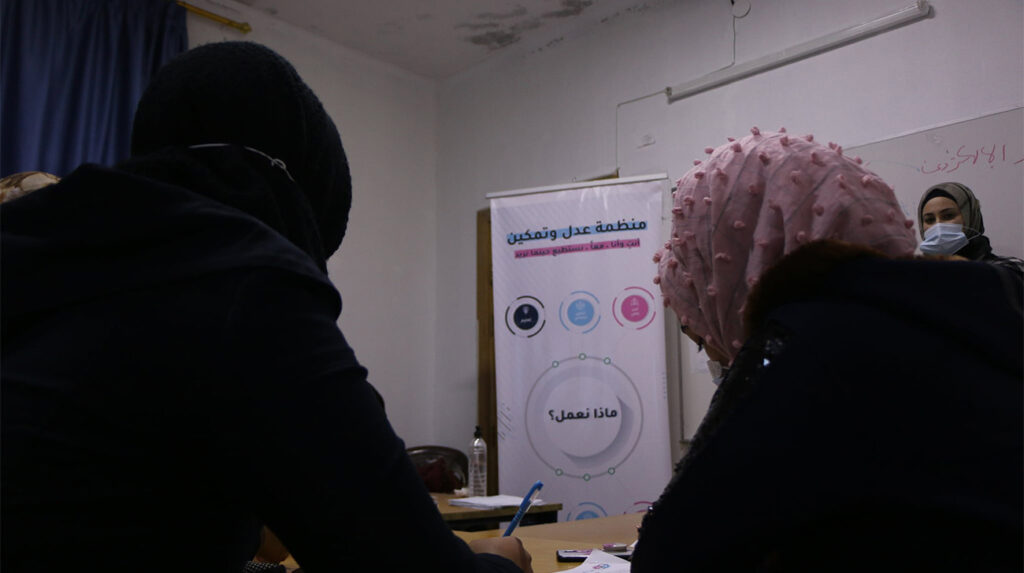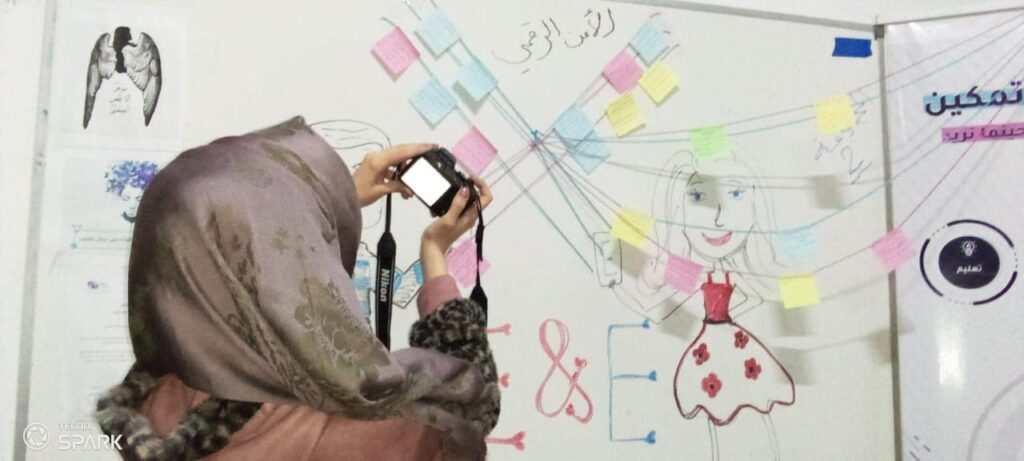
Introduction:
With increasing reliance on the internet for both personal and professional life, digital risks and violations are also on the rise, necessitating greater digital awareness.
The project “Safe Digital Spaces for Women to Speak Freely” was launched to empower Syrian women in the field of digital security. It began in December 2020 and ended in May 2021, implemented in the town of Kafr Yahmul. The project directly benefited 40 women and indirectly impacted 200 individuals. By focusing on digital security and citizenship, this initiative aimed to empower women from diverse ethnic and religious backgrounds, fostering inclusion and safe expression within their communities.
Context and Importance:
In many parts of the world, women face significant barriers to expressing themselves and participating in public life. These barriers, often cultural, social, or economic, can be exacerbated in rural or conflict-affected areas. Digital spaces offer a unique opportunity to overcome these obstacles by providing platforms for safe communication, learning, and activism. However, to effectively utilize these spaces, women need the skills and knowledge to navigate digital environments safely.

Project Implementation and Activities:
The “Safe Digital Spaces for Women to Speak Freely” project was designed around the following principles:
• Right to Privacy
• Right to Internet Access
• Right to Digital Security
The project included several components, such as:
• Digital Security Training: This component provided basic training in digital security, ensuring that women could protect their personal information and navigate online spaces without fear of harassment or exploitation. The training covered password management, phishing awareness, and privacy settings on social media platforms.
• Inclusive Community Engagement: A unique aspect of the project was its inclusiveness. Women from different ethnic and religious backgrounds, many of whom had never left their villages or interacted with neighboring communities, were brought together. This diversity enriched the learning experience and fostered a sense of unity and mutual support among the participants.
• Knowledge Sharing: After completing their training, women were encouraged to share their newly acquired knowledge with others in their communities, extending the project’s impact beyond the initial participants and reaching a broader audience.
The project successfully trained 40 women in Kafr Yahmul and surrounding villages, significantly enhancing their ability to navigate and use digital spaces safely and effectively. The indirect benefits reached an additional 200 individuals, as the trainees shared their knowledge with their communities. By equipping these women with digital skills, the project helped them gain confidence, express themselves safely online, and become active participants in their communities.
The “Safe Digital Spaces for Women to Speak Freely” project highlighted the crucial role of digital empowerment in promoting gender equality and social inclusion. By focusing on digital security and citizenship, the project equipped women with the tools they need to engage confidently and safely in the digital world. The project’s inclusive nature ensured that women from diverse backgrounds could come together, learn from each other, and build stronger, more connected communities.
In an era where digital communication is of paramount importance, such initiatives are essential to bridging the gaps. Continued efforts to provide digital education and security training are critical to ensuring that all individuals, regardless of their background or location, can fully and safely participate in the digital age.
Success Story:
Najwa, 42, reached success and climbed to the top despite the obstacles she faced. Her inspiring story teaches us about determination and persistence in achieving what we desire and aim for.
Born in the town of Kafr Yahmul, Najwa had an active and lively childhood. She loved school and learning, but due to her family’s living conditions and the illness of her mother and sister, her family forced her to stop her education to manage the household. She never accepted the discouraging statements like “Your end is to your husband’s house” and “What does a girl need education for?” along with many other disheartening remarks she could not accept. She tried to study for her middle school certificate at home, but her efforts were rejected and unsuccessful.
Later, she got married and found no outlet but to read books and educate her children excellently. Recently, hope was renewed for Najwa when she enrolled at Equity and Empowerment Center in the digital security, electronic protection, and mobile and computer maintenance course. She was afraid of failing, as many around her had bet she would.
She was told: “You won’t succeed because you don’t have a certificate, so how will you fix a smart device?” and “Too old for learning,” but Najwa did not succumb to their whispers or thoughts. She decided to take the risk and go through the experience, whatever the outcome, gathering all the determination and willpower she could.
Today, Najwa has completed her digital security and electronic maintenance training, surprising everyone around her with her quick learning and acceptance of information and ideas.
She has learned wonderfully how to maintain smart devices and detect and repair faults.
Najwa says, “I thank the Equity and Empowerment team, who encouraged me to take the challenge and helped me achieve my goal and succeed. I have proven to the world around me that I am strong, responsible, and capable of overcoming difficulties and succeeding.”
Introduction:
With increasing reliance on the internet for both personal and professional life, digital risks and violations are also on the rise, necessitating greater digital awareness.
The project “Safe Digital Spaces for Women to Speak Freely” was launched to empower Syrian women in the field of digital security. It began in December 2020 and ended in May 2021, implemented in the town of Kafr Yahmul. The project directly benefited 40 women and indirectly impacted 200 individuals. By focusing on digital security and citizenship, this initiative aimed to empower women from diverse ethnic and religious backgrounds, fostering inclusion and safe expression within their communities.
Context and Importance:
In many parts of the world, women face significant barriers to expressing themselves and participating in public life. These barriers, often cultural, social, or economic, can be exacerbated in rural or conflict-affected areas. Digital spaces offer a unique opportunity to overcome these obstacles by providing platforms for safe communication, learning, and activism. However, to effectively utilize these spaces, women need the skills and knowledge to navigate digital environments safely.

Project Implementation and Activities:
The “Safe Digital Spaces for Women to Speak Freely” project was designed around the following principles:
• Right to Privacy
• Right to Internet Access
• Right to Digital Security
The project included several components, such as:
• Digital Security Training: This component provided basic training in digital security, ensuring that women could protect their personal information and navigate online spaces without fear of harassment or exploitation. The training covered password management, phishing awareness, and privacy settings on social media platforms.
• Inclusive Community Engagement: A unique aspect of the project was its inclusiveness. Women from different ethnic and religious backgrounds, many of whom had never left their villages or interacted with neighboring communities, were brought together. This diversity enriched the learning experience and fostered a sense of unity and mutual support among the participants.
• Knowledge Sharing: After completing their training, women were encouraged to share their newly acquired knowledge with others in their communities, extending the project’s impact beyond the initial participants and reaching a broader audience.
The project successfully trained 40 women in Kafr Yahmul and surrounding villages, significantly enhancing their ability to navigate and use digital spaces safely and effectively. The indirect benefits reached an additional 200 individuals, as the trainees shared their knowledge with their communities. By equipping these women with digital skills, the project helped them gain confidence, express themselves safely online, and become active participants in their communities.
The “Safe Digital Spaces for Women to Speak Freely” project highlighted the crucial role of digital empowerment in promoting gender equality and social inclusion. By focusing on digital security and citizenship, the project equipped women with the tools they need to engage confidently and safely in the digital world. The project’s inclusive nature ensured that women from diverse backgrounds could come together, learn from each other, and build stronger, more connected communities.
In an era where digital communication is of paramount importance, such initiatives are essential to bridging the gaps. Continued efforts to provide digital education and security training are critical to ensuring that all individuals, regardless of their background or location, can fully and safely participate in the digital age.
Success Story:
Najwa, 42, reached success and climbed to the top despite the obstacles she faced. Her inspiring story teaches us about determination and persistence in achieving what we desire and aim for.
Born in the town of Kafr Yahmul, Najwa had an active and lively childhood. She loved school and learning, but due to her family’s living conditions and the illness of her mother and sister, her family forced her to stop her education to manage the household. She never accepted the discouraging statements like “Your end is to your husband’s house” and “What does a girl need education for?” along with many other disheartening remarks she could not accept. She tried to study for her middle school certificate at home, but her efforts were rejected and unsuccessful.
Later, she got married and found no outlet but to read books and educate her children excellently. Recently, hope was renewed for Najwa when she enrolled at Equity and Empowerment Center in the digital security, electronic protection, and mobile and computer maintenance course. She was afraid of failing, as many around her had bet she would.
She was told: “You won’t succeed because you don’t have a certificate, so how will you fix a smart device?” and “Too old for learning,” but Najwa did not succumb to their whispers or thoughts. She decided to take the risk and go through the experience, whatever the outcome, gathering all the determination and willpower she could.
Today, Najwa has completed her digital security and electronic maintenance training, surprising everyone around her with her quick learning and acceptance of information and ideas.
She has learned wonderfully how to maintain smart devices and detect and repair faults.
Najwa says, “I thank the Equity and Empowerment team, who encouraged me to take the challenge and helped me achieve my goal and succeed. I have proven to the world around me that I am strong, responsible, and capable of overcoming difficulties and succeeding.”